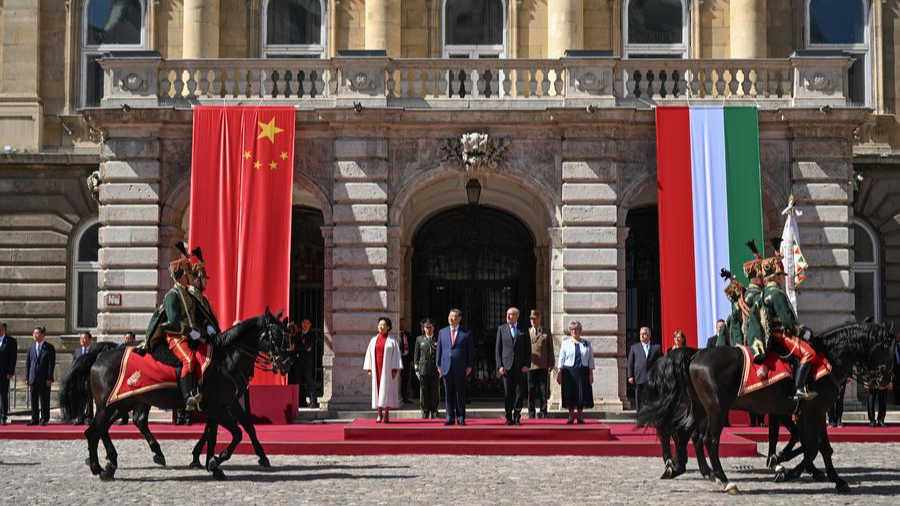
Chinese President Xi Jinping attends a welcome ceremony jointly held by Hungarian President Tamás Sulyok and Prime Minister Viktor Orbán in Budapest, Hungary, May 9, 2024. [Photo/Xinhua]
By Bradley Blankenship
Marking the 75th anniversary of the establishment of diplomatic ties between China and Hungary, the two countries agreed on May 9 to elevate their bilateral relationship to an "all-weather comprehensive strategic partnership for the new era." This was announced during talks by Chinese President Xi Jinping and Hungarian Prime Minister Viktor Orbán.
Before President Xi Jinping's state visit, a signed article by Xi titled "Embarking on a Golden Voyage in China-Hungary Relations" was published on May 8 in the Hungarian newspaper Magyar Nemzet praising the close relationship between the two countries. He called on China and Hungary to lead the course of stable China-Europe relations as a whole, noting that "recently, there are signs of stability for the better in China-Europe relations."
"We are ready to work with Hungary to deepen and substantiate China's cooperation with Central and Eastern European countries and to ensure steady and sustained growth of China-Europe relations." Xi said.
Hungary has proven itself a reliable partner for China and is committed to cooperation without ideological strings attached. In 2010, Budapest began implementing its so-called "Opening to the East" policy, underscoring the ever-eastward drift of global economic activity.
Since then, China has become Hungary's largest non-European trading partner, with more than 4 percent of the country's entire trade coming from cooperation with China. China has also consistently been the first or second-highest non-EU investor in Hungary.
Hungary is already a regional hub for the Bank of China and Huawei Consumer Services. Additionally, BYD, China's electric vehicle behemoth, announced last December a major assembly plant in Hungary, the first of its production facilities in Europe. It will produce vehicles and components for the European market. Another EV firm, Great Wall Motor, is also looking to expand its operations in the country.
In 2015, Hungary also became the first country in Europe to join the Belt and Road Initiative (BRI). The forthcoming Hungary-Serbia railway is the most significant BRI project in Central and Eastern Europe (CEE).
In diplomatic affairs, China and Hungary share similar views on upholding multilateralism, engaging with nations on equal terms, and pursuing win-win cooperation. This is why Hungary has, for example, often protested or blocked EU sanctions related to the Ukraine conflict and some EU positions on China, in hopes of pursuing a more autonomous position for the bloc. Notably, in 2021, Budapest vetoed an EU statement criticizing China's National Security Law for its Hong Kong Special Administrative Region.
Starting in July, Hungary will take over the rotating presidency of the EU Council for the latter half of this year. According to Foreign Minister Péter Szijjártó in an interview with the Global Times, Hungary can use the opportunity to influence the EU's policy toward China. But many of the opportunities in Europe-China relations are already apparent, if under-reported.
Much of the Western media, including U.S. state media, have cast President Xi's Europe trip – to France, Serbia, and Hungary – as a sign of tensions between the EU and China. Far from it. German Chancellor Olaf Scholz just recently visited China in April along with a business delegation; leaders from Belgium, Spain and the Netherlands also visited China; and the president and prime minister of Italy are planning a trip later this year.

People welcome Chinese President Xi Jinping in Budapest, Hungary, May 8, 2024. [Photo/Xinhua]
The symbolism of President Xi's trip should also be noted, including his visit to one of the founding Western European member states of the EU (France), a relatively new "Eastern" member state (Hungary), and a major EU-candidate state in the Balkan region (Serbia).
Despite the harsh words and talks of "de-risking" from some EU functionaries and member state leaders, opportunities are abundant for China-Europe relations across the spectrum. Investments keep expanding, business keeps moving forward, and trade is growing. European and Chinese firms remain optimistic about each other's markets, with the 2023 Annual Report of the China Chamber of Commerce to the EU (CCCEU) showing that more than 80 percent of surveyed Chinese companies plan to enhance their business in Europe.
Europe and China can be mutually beneficial partners in the new era. Hungary, in particular, is an example of how working together can bring about prosperity. It is to be hoped that the fruits of this bilateral cooperation can be demonstrated clearly in the second half of this year during Budapest's EU Council presidency.
Bradley Blankenship, a special commentator on current affairs for CGTN, is a Prague-based American journalist, political analyst, and freelance reporter.

 中文
中文



